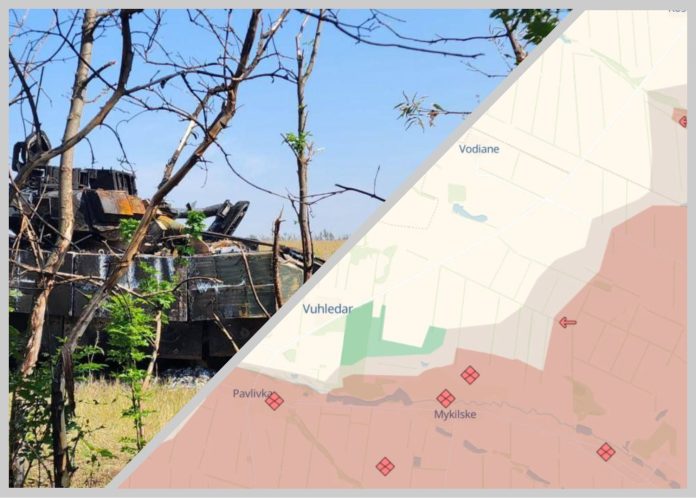Ukrainian media reported Russian troops advancing in eastern Ukraine, while President Volodymyr Zelensky announced a readiness to discuss borders as part of “achieving peace.”
Russian forces advanced near Vuhledar, in the area of the Solonenka gully towards the highway through which Ukrainian troops receive supplies in Kostiantynivka, Donetsk region. A Russian assault unit reportedly entered the southern outskirts of the town. According to Ukrainian media, active fighting is also taking place near the village of Novomykhailivka to the east of Kostiantynivka.
For two years, the Russians have been incapable of capturing Vuhledar, a key strategic city for the Armed Forces of Ukraine (AFU) in Donbas (the common name for the Luhansk and Donetsk regions). Now Russian forces decided to bypass the city, focusing on more non-obvious objectives.
The troops also entered Toretsk, initiating battles within the city. Offensive operations continue in the strategically important Pokrovsk area after the Russians seized the village of Prohres and the town of Ocheretyne.
Back in early July, Le Monde, citing a spokesman for the Khortytsia operational group, reported about the advance of the Russian forces and the gradual retreat of Ukrainian soldiers in Donbas.
Military experts note that the Russian Air Force strikes on Ukrainian stockpiles and airfields contributed to the success of the offensive.
According to Ukrainian media, Russians struck Kharkiv’s airbase and destroyed an ammunition depot in the village of Bohuslavka. The strike was carried out after several days of tracking the actions of Ukrainian troops.
The Su-34 fighter-bomber hit the targets with Kh-35 guided missiles, completely destroying the ATSR-33S air traffic control radar and severely damaging the Skala-M camouflaged radar station.
Tensions are rising
Meanwhile, pressure is mounting within Ukraine. A resident of Khmelnytskyi, a city in western Ukraine, won a court case against the Territorial Recruitment Centre (TRC). The military enlistment office was obliged to grant the man a mobilisation deferment.
According Ukrainian media, the army wanted to draft the plaintiff to serve in the AFU despite the fact that he has a father with a disability. The court found the actions of the TRC unlawful, considering the documents on the right to deferment legal.
Earlier, several mobilised persons escaped from a TRC van when the driver stopped to refuel.
In Odesa, the Security Service of Ukraine (SSU) reported the detention of six people suspected of setting fire to the vehicles of TRC employees and AFU soldiers. According to the SSU, the detained Odesa residents face between 18 and 24 years in prison. It is alleged that they tried to burn more than 15 vehicles over the course of two weeks.
“Working undercover as a courier delivery service, they drove around the city on their own scooters, identifying parking addresses for Defence Force vehicles. (…) They worked mostly in pairs, one setting the fire and the other filming it.”
Meanwhile, the commander of the Anti-Tank Battalion of the 3rd Separate Assault Brigade, Oleh Romanov, stated that he had given permission to shoot those who set fire to military vehicles at the rear.
I give verbal permission to my fighters to shoot those creatures on the spot, such traitors must be eliminated on the spot, relying on wartime. (…) Such things must be exemplary.
Against the backdrop of total mobilisation, arson attacks on vehicles of TRC employees spread across the country. Due to the mass burning of cars belonging to military commissions and AFU soldiers, many owners of similar brands of vehicles began to attach the inscription “Not TRC” to their cars.
Talks on territorial integrity of Ukraine
The situation escalated so much that Ukrainian President Volodymyr Zelensky stated that the authorities would start “detailed discussions with relevant countries on issues of territorial integrity.” He added that Ukraine would develop a “peace action plan” by the end of November.
Zelensky gave an exclusive interview to Japanese broadcaster NHK, talking about the prospects for ending the war, his relationship with former US President Donald Trump and his hopes for Japan’s continued support.
“Japan is a representative of the Group of Seven and has provided us with economic, humanitarian and technical support. They came to our aid so quickly. It was the first non-NATO country to sign a security cooperation deal with Ukraine.”
Earlier, the president said that he would agree to talks with Russia when Ukraine reached its internationally recognised borders.
So we emphasise once again: Ukraine will be ready for one or another format of diplomacy when we have our borders. Our real borders according to the international law.
When talking about “real borders,” Zelensky apparently meant not only the territories lost during the war, but also Crimea, which came under Russian control in 2014. However, in September 2022, he signed a decree banning talks with Russian President Vladimir Putin and his government, according to Reuters.
Amid growing pressure on the frontline and domestic turmoil, the Ukrainian authorities are talking about peace negotiations more and more frequently. On 23 July, Ukrainian Foreign Minister Dmytro Kuleba said during a visit to China that Ukraine was ready to negotiate, but Russia considered the statement as an attempt to provide a “respite” from the hostilities.
